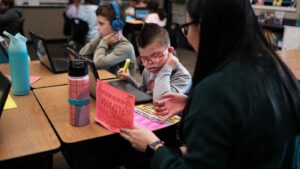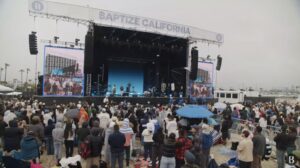Date Posted: 2024-12-15 14:56:35 | Video Duration: 00:42:18
In a society increasingly marked by division and polarization, the question arises: what role can Christians play in fostering peace and understanding? Addressing this, the “Difficult Conversations” podcast, hosted by National Association of Evangelicals (NAE) President Walter Kim, explores the challenges of engaging in meaningful dialogue amidst a culture that often prefers sound bites over deep engagement. Through stories of individuals who have bravely entered contentious spaces to build bridges, the podcast highlights the importance of difficult conversations in the pursuit of unity.
Exploring Common Ground
Tim Dixon, co-founder of More in Common, recently joined the podcast to discuss how society can find commonality amidst perceived polarization. More in Common’s recent report sheds light on how our beliefs may not be as polarized as we think, largely influenced by social media and the amplification of extreme voices. Dixon’s journey, spanning roles as a speechwriter for Australian prime ministers to tackling intractable social issues, reflects a commitment to addressing societal challenges through innovative approaches.
Dixon emphasizes the importance of addressing perception gaps—misunderstandings about the beliefs and values of different groups—which exacerbate polarization. For instance, a common misconception is that evangelicals are primarily driven by political agendas. However, Dixon’s research indicates that politics is less central to evangelicals’ lives than often portrayed. By illuminating these perception gaps, More in Common aims to reduce division and foster a more nuanced understanding of diverse communities.
Challenging Misconceptions
The report “Promising Revelations: Undoing False Impressions of America’s Faithful” identifies three major misconceptions about religious communities: that faith is predominantly political, that religion is becoming irrelevant, and that religious individuals are inherently intolerant. Through comprehensive surveys and focus groups, the study reveals that these misconceptions do not hold up against the lived realities of religious communities.
For example, while many perceive evangelicals as heavily invested in politics, only 4% of evangelicals actually consider politics central to their identity. Similarly, the notion that religious individuals are intolerant is challenged by findings that a significant majority of religious groups believe in inclusivity and belonging for all, regardless of faith background.
The Role of Ingroup Moderates
Dixon also highlights the critical role of “ingroup moderates”—individuals within a community who can offer a balanced perspective and foster dialogue across divides. These moderates, by validating the humanity and perspectives of others, are key to shifting entrenched views and reducing polarization. However, many potential ingroup moderates are reluctant to step into leadership roles due to fear of conflict and public scrutiny.
To counter these challenges, More in Common focuses on restoring a sense of hope and possibility, encouraging individuals to engage in constructive dialogue and build bridges. By empowering communities to see beyond divisive narratives, the organization aims to foster environments where diverse perspectives can coexist and thrive.
Churches as Catalysts for Change
Churches, with their unique reach into communities and their prophetic role in addressing societal dysfunctions, are positioned to be powerful agents of change. Dixon urges faith communities to live out the ideals of a multiethnic church, emphasizing unity and reconciliation. By modeling inclusive relationships and prioritizing biblical teachings over divisive media narratives, churches can become off-ramps from societal division, offering a vision of hope and transformation.
In conclusion, while the challenges of division and polarization are significant, small acts of connection and understanding can lead to meaningful change. As Dixon notes, even brief conversations across divides can significantly increase willingness to engage with differing viewpoints. By focusing on local communities and leveraging the unique strengths of faith groups, there is potential for a movement that transcends division and fosters a more harmonious society.




